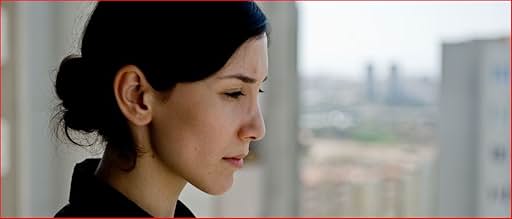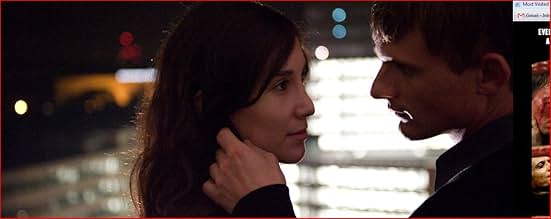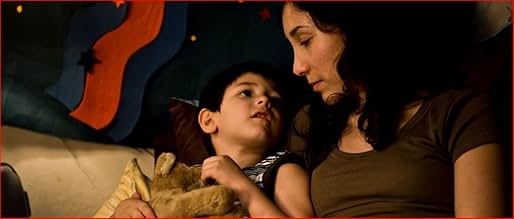IMDb-BEWERTUNG
7,5/10
5663
IHRE BEWERTUNG
Umay, eine junge Frau türkischer Abstammung, kämpft gegen den Widerstand ihrer Familie für ein unabhängiges und selbstbestimmtes Leben in Deutschland. Ihr Kampf setzt eine Dynamik in Gang, d... Alles lesenUmay, eine junge Frau türkischer Abstammung, kämpft gegen den Widerstand ihrer Familie für ein unabhängiges und selbstbestimmtes Leben in Deutschland. Ihr Kampf setzt eine Dynamik in Gang, die in eine lebensbedrohliche Situation mündet.Umay, eine junge Frau türkischer Abstammung, kämpft gegen den Widerstand ihrer Familie für ein unabhängiges und selbstbestimmtes Leben in Deutschland. Ihr Kampf setzt eine Dynamik in Gang, die in eine lebensbedrohliche Situation mündet.
- Auszeichnungen
- 30 Gewinne & 14 Nominierungen insgesamt
Gümeç Alpay Aslan
- Zeynep
- (as Gümec Alpay)
Empfohlene Bewertungen
10ssdd_000
I would like to thank everyone who created this heart breaking movie, you might question the story line if it's true story or not. I have signed up just to tell you that it's true and some women who have suffered like Umay and had experienced much more greater pain and near death experience from there own family. I'm one of them.. a 30 years old woman with 7 years old child. The difference between me and Umya is that when she found the door locked in her family place, she called the police And I can't ! the difference is she is living in country that respects humans and offer help to anyone in danger while I'm not .. I'm living in the most restricted religious country that gave men the power in everything to control a women life. I have called violence police unite and they couldn't reach me. I have been threatened by machine gun day and night. I can't take my son and run away cause nothing can be done without guardian permission. My story continues and this movie have given my strength to fight my own battle. The question will remains (am I allowed to take the decision of my son's life.. or leave my son with my family so he do experience the life of a refugee with his mom ?) Thank you again .. this movie touched my heart and I'll always remember Umay ..
The basic plot is simple: a young lady with a crazy in-laws feds up and leaves making her a total outcast. The acting seemed a bit too dramatic and overly polished. The actors are obviously talented and have done their best, but it showed that they were trying too hard, which took away the realism I was anticipating. More than a few scenes were simply yelling and slapping which I've found quite raw. The close-ups were nice generally with beautiful faces, occasionally with oblique views. At times, when we were shown a scene with people staring at each other silently which meant that the discussion was over, I wondered if that was really the case and not if we were witnessing a zen moment. As a side note, I just have to point out that the subject of film has little to do with religion or being a "muslim". The problem is far too deep which is really a sociological phenomena rooted in dogmatic cultural upbringings and a feudal life style (mostly) of the eastern part of country where people are just a dot in the family picture rather than individuals with autonomy. You could see that nobody in the family wanted to be a part of what was going on but they could not behave otherwise -- they were slaves of their communities even thousands of miles away.
This film is very realistic. Its detailed depiction of one Turkish family living in Berlin casts overtones for a greater problem of European multiculturalism. But forget the wider scope of those implications for now. The film is very focused on Turkish culture within Germany and one of its great weaknesses: what it considers to be saving the "honor" of the family. The older daughter in the film has left her violent and abusive husband in Turkey and moved back to her family in Germany. Her parents immediately side with her husband, and they repeatedly ask the daughter to return to him. But the daughter has sacrificed much to get away, and will not return. After an attempt to kidnap her son and return him to the father fails, she moves out...and moves again...and moves again as problems mount. Her younger brother and sister, although initially supportive of her, slowly begin to turn against her as the shame of her living independently with child causes the Turkish community to isolate the family. This ultimately leads to a final decision by the men in the family, with tragic results.
The family is Muslim, although Islam is not portrayed as the reason why the family is shamed by the older daughter. In the culture, it is easy for an independent woman to bring shame to the family, especially if she leaves her husband. At no time do the parents ever seriously consider the perspective of their daughter. It is quite clear, she has to maintain the family honor at all costs; which in this case means returning to her husband. As the daughter continues to make unwise choices by maintaining contact with her family because she loves them, the unwritten codes of this "honor" system will drive the family into greater acts of cruelty. This film can make you very angry indeed at the injustice to women done by patriarch based communal cultures. The "honor" that they cling to is so twisted. It is based on a superficial sense of righteousness that has little basis in truth. It is more concerned with appearances than justice. More concerned with blind obedience than righteousness. And that concept is promoted in Islam, though not exclusively.
This film should be mandatory viewing for any woman in similar straits as the main character in the film who has needed to separate from the family for safety. The Germans have provided good resources for such women, but they are advised, "For now, avoid contact with your family." One of this beautifully done film's main points is: Once you leave or are forced to leave the family, it may be for good. You cannot expect your family to sympathize with you, support you, or even accept you as family. There is a good chance they WILL turn against you if the community slanders the family. And a woman who leaves her abusive husband, lives alone, calls the police for safety, or takes any action to safeguard her life and livelihood may very well be thought of as nothing more than a "whore" by the rest of the German Turkish community. Contact your family again at risk to your life! I would wish that Turkish men (those who are perpetrators, that is) who see this would also feel ashamed for some of their sexist standards, but I don't know if they would...
The film is very moving and well done. The actors all fulfill their roles, particularly the leading lady. The eye communication of the cast is extremely profound, leaving you wondering about all of the unspoken thoughts stewing in their heads. The writing allows sympathy with all of the characters while still clearly pointing out who is right and who is wrong. You see they all have deep passions about righteousness. It's just that some are righteous and others are not. It is a simple story that casts deep shadows on complexities of cultural clashes. This is not a film that will break grounds in cinematography, but it is a brave film and urgent as the Muslim (both immigrant and native) population rises in Europe. Hopefully this will start a trend that will cause the Turkish culture to think about what true honoring of the family really is.
The family is Muslim, although Islam is not portrayed as the reason why the family is shamed by the older daughter. In the culture, it is easy for an independent woman to bring shame to the family, especially if she leaves her husband. At no time do the parents ever seriously consider the perspective of their daughter. It is quite clear, she has to maintain the family honor at all costs; which in this case means returning to her husband. As the daughter continues to make unwise choices by maintaining contact with her family because she loves them, the unwritten codes of this "honor" system will drive the family into greater acts of cruelty. This film can make you very angry indeed at the injustice to women done by patriarch based communal cultures. The "honor" that they cling to is so twisted. It is based on a superficial sense of righteousness that has little basis in truth. It is more concerned with appearances than justice. More concerned with blind obedience than righteousness. And that concept is promoted in Islam, though not exclusively.
This film should be mandatory viewing for any woman in similar straits as the main character in the film who has needed to separate from the family for safety. The Germans have provided good resources for such women, but they are advised, "For now, avoid contact with your family." One of this beautifully done film's main points is: Once you leave or are forced to leave the family, it may be for good. You cannot expect your family to sympathize with you, support you, or even accept you as family. There is a good chance they WILL turn against you if the community slanders the family. And a woman who leaves her abusive husband, lives alone, calls the police for safety, or takes any action to safeguard her life and livelihood may very well be thought of as nothing more than a "whore" by the rest of the German Turkish community. Contact your family again at risk to your life! I would wish that Turkish men (those who are perpetrators, that is) who see this would also feel ashamed for some of their sexist standards, but I don't know if they would...
The film is very moving and well done. The actors all fulfill their roles, particularly the leading lady. The eye communication of the cast is extremely profound, leaving you wondering about all of the unspoken thoughts stewing in their heads. The writing allows sympathy with all of the characters while still clearly pointing out who is right and who is wrong. You see they all have deep passions about righteousness. It's just that some are righteous and others are not. It is a simple story that casts deep shadows on complexities of cultural clashes. This is not a film that will break grounds in cinematography, but it is a brave film and urgent as the Muslim (both immigrant and native) population rises in Europe. Hopefully this will start a trend that will cause the Turkish culture to think about what true honoring of the family really is.
The film she she is a victim of the traditional culture, in the cultural system of human nature, she just husband and home accessories, and is never her own most of the world are all traditional male-dominated roles if which day I hope the human progress in addition to the increasingly advanced technology and the trend of men's and women's position is equal
After seeing this film, I assumed it was directed by a Turkish director named Feo Aladag. When I googled this name, a picture of a young blond woman filled the screen. As it turned out, Feo Aladag is an Austrian actress/director, married to Turkish/German author Zuli Aladag, who is also the producer of Die Fremde.
I mention this because I think it is important. In this film, the Turkish community in Germany is not pictured in a very favourable way. The story shows the fate of Umay, a young Turkish/German woman who wants a divorce because her husband beats her and because, perhaps more importantly, she doesn't love him. She leaves her husband and moves with her young son to her family in Berlin. Surprisingly, her father and brother take sides with her husband and urge her to return to him. In their view, she has dishonoured her husband and her own family by separating her son from his father. This conflict escalates in a dramatic way, with terrible consequences.
The film pictures Umay as a woman who is denied her 'Western' rights as a woman and a mother, and shows her family as driven by 'non-Western' values like honour and tradition. For them, the community is superior over the individual. For her, it's the other way round.
The message is pessimistic. Umay is a Turkish woman who adopts the German lifestyle. She wants to live her own life. She follows the integration model that the Turkish people in Western Europe are supposed to follow. But her brother and sister don't support her, although they are born and raised in Germany. They speak the German language, but think the Turkish way.
Like some of the films of Faith Akin (in which lead actress Sibel Kekilli also starred) this film focuses on the problems of the Turkish community in Germany. But it has a darker and more pessimistic tone. It's a very powerful movie, dealing with a very urgent issue.
I mention this because I think it is important. In this film, the Turkish community in Germany is not pictured in a very favourable way. The story shows the fate of Umay, a young Turkish/German woman who wants a divorce because her husband beats her and because, perhaps more importantly, she doesn't love him. She leaves her husband and moves with her young son to her family in Berlin. Surprisingly, her father and brother take sides with her husband and urge her to return to him. In their view, she has dishonoured her husband and her own family by separating her son from his father. This conflict escalates in a dramatic way, with terrible consequences.
The film pictures Umay as a woman who is denied her 'Western' rights as a woman and a mother, and shows her family as driven by 'non-Western' values like honour and tradition. For them, the community is superior over the individual. For her, it's the other way round.
The message is pessimistic. Umay is a Turkish woman who adopts the German lifestyle. She wants to live her own life. She follows the integration model that the Turkish people in Western Europe are supposed to follow. But her brother and sister don't support her, although they are born and raised in Germany. They speak the German language, but think the Turkish way.
Like some of the films of Faith Akin (in which lead actress Sibel Kekilli also starred) this film focuses on the problems of the Turkish community in Germany. But it has a darker and more pessimistic tone. It's a very powerful movie, dealing with a very urgent issue.
Wusstest du schon
- WissenswertesGermany's official submission for the Best Foreign Language Film Award at the 83rd Annual Academy Awards in 2011.
- VerbindungenFeatures Biçak sirti (2007)
- SoundtracksSO 36 - Party
Performed by Steffen Irlinger & Marian Mülle
(P) 2010 Colosseum Music Entertainment GmbH
Top-Auswahl
Melde dich zum Bewerten an und greife auf die Watchlist für personalisierte Empfehlungen zu.
- How long is When We Leave?Powered by Alexa
Details
- Erscheinungsdatum
- Herkunftsland
- Offizielle Standorte
- Sprachen
- Auch bekannt als
- When We Leave
- Drehorte
- Produktionsfirmen
- Weitere beteiligte Unternehmen bei IMDbPro anzeigen
Box Office
- Bruttoertrag in den USA und Kanada
- 19.631 $
- Eröffnungswochenende in den USA und in Kanada
- 6.018 $
- 30. Jan. 2011
- Weltweiter Bruttoertrag
- 1.338.132 $
- Laufzeit
- 1 Std. 59 Min.(119 min)
- Farbe
- Sound-Mix
- Seitenverhältnis
- 2.35 : 1
Zu dieser Seite beitragen
Bearbeitung vorschlagen oder fehlenden Inhalt hinzufügen



























